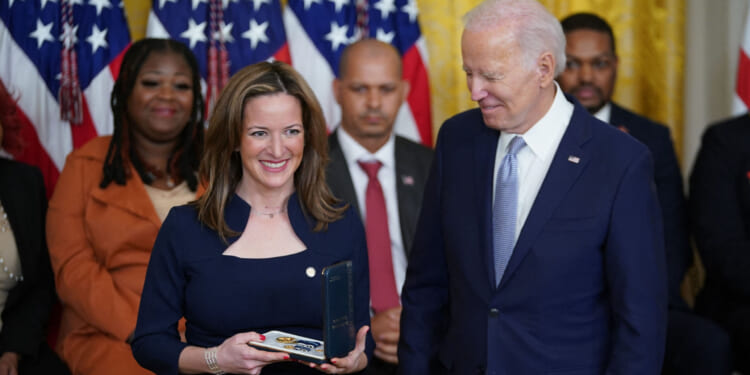A new law in Michigan means that inmates leaving prison will be registered automatically to vote, among other election-related measures signed by Gov. Gretchen Whitmer, a Democrat.
Michigan is one of 23 states that already allow those with felony convictions to reclaim their voting rights, according to the National Conference of State Legislatures.
However, under the new law inmates will be preregistered while still incarcerated, so that they will be on the state’s voter registration rolls upon release.
“Most states establish a system for restoring felon voting rights. What we are seeing in Michigan is politicians who think they might benefit from a supposed voting bloc,” Jason Snead, executive director of the Honest Elections Project, told The Daily Signal.
“I would challenge them to restore Second Amendment rights of all felons as well,” Snead said. “When someone commits a crime, they risk losing a host of fundamental freedoms for a while, including First Amendment rights.”
Michigan residents aren’t affiliated with a political party under the automatic voter registration system, said Khyla Craine, deputy legal director in the office of Secretary of State Jocelyn Benson, Michigan’s top election official.
“This is not special treatment for felons. This is just to ensure that they are treated like every other Michigander,” Craine told The Daily Signal. “We put their names in a voter registration list that isn’t active and when we receive notice from the Department of Corrections [that] someone is released, their registration is turned on.”
Vermont is the only state that allows prison inmates to vote by absentee ballot. The District of Columbia and the territory of Puerto Rico also allow inmates to vote, according to the Justice Department.
This is an effort by the Left to create a more favorable electorate, including voting rights for noncitizens as well as minors, Snead said.
“This is part of the broader push on the left to remake the electorate, with noncitizen voting, voting for 16- and 17-year-olds, and some activists want mail-in ballots to go directly to incarcerated individuals still serving their sentence,” Snead said. “Voters should be selecting politicians. Politicians shouldn’t be selecting their voters.”
The strategy is an old one. As explained in my book “The Myth of Voter Suppression,” Democratic Party machines such as Tammany Hall once worked to get prisoners released to ensure that they voted. Some established a “naturalization mill” to instantly turn immigrants coming off boats into voters.
Other political machines—such as the Pendergast machine in Kansas City, the Daley machine in Chicago, and the Long machine in Louisiana—engaged in similar conduct to expand sympathetic voting blocs.
Whitmer signed House Bill 4983 on Nov. 30. The new law gives Michigan’s secretary of state the power to designate a state agency as an automatic voter registration agency if that agency routinely collects information from individuals that would confirm their eligibility to register to vote. It also requires the secretary of state and the Michigan Department of Corrections to coordinate to ensure that eligible individuals are registered to vote when released from incarceration.
The law, which takes effect in 2025, largely codifies the Michigan Department of Corrections’ existing agreement with the Office of the Secretary of State, said Craine, the office’s deputy legal director.
The agreement went into effect in 2020, and Michigan added 5,000 felons to the voting rolls since that time, according to NPR.
Whitmer also signed other election laws to criminalize violence against election workers and ban the use of “deep fakes” and artificial intelligence in campaign ads.
Have an opinion about this article? To sound off, please emailletters@DailySignal.com and we’ll consider publishing your edited remarks in our regular “We Hear You” feature. Remember to include the url or headline of the article plus your name and town and/or state.












